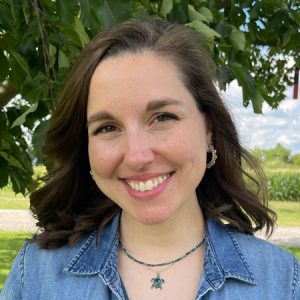Sep. 8, 2025
This is part of a series of Q&As introducing faculty who have joined the College of Health Sciences for the 2025–26 academic year. Meet all of our new faculty members.
Elaine Durchholz Sowell
Clinical coordinator and instructor, Department of Clinical and Diagnostic Sciences
What classes are you teaching this semester?
We are currently building the curriculum for the new Medical Laboratory Science program, and our first cohort will start in summer 2027. At that time, I will teach Clinical Chemistry and Clinical Hematology and Coagulation.
Tell us about yourself. What is your background?
I’m originally from Southern Indiana and earned my Bachelor of Science in Biology from the University of Evansville in 2011. In 2016, I completed the School of Medical Laboratory Science at Good Samaritan Hospital in Vincennes, Indiana, and earned my MLS(ASCP) certification. Over the past nine years, I’ve worked as a generalist MLS, served as a bench instructor for clinical students and acted as my lab’s safety and education coordinator. I also began teaching Clinical Chemistry and Urinalysis as an adjunct for the Moberly Area Community College MLT program, where I’ve enjoyed combining both the practical and classroom aspects of educating and training future lab professionals.
What brought you to Mizzou? To your field?
I’ve always been fascinated by the biology and chemistry of how our bodies function. I knew I wanted a role in health care, but I hoped to find one without direct patient care. After gaining experience in a pharmaceutical lab, I discovered medical laboratory science and quickly realized the hospital lab was the perfect fit. Our work directly informs patient care by guiding diagnosis, monitoring disease and evaluating treatment, all with little to no patient contact.
I am so excited to help build our new MLS program from the ground up, particularly with developing our unique simulation lab featuring hospital-grade analyzers. This hands-on experience will truly set us apart and give our students a huge advantage as they enter their clinical rotations and careers ahead.
What is your favorite thing about your job?
My favorite part of working in the lab and in lab education is mentoring clinical students and new trainees, helping them gain a deeper understanding of the analyses they perform. Seeing their confidence grow as their skills improve is so rewarding, and that growth translates into more efficient and effective patient care, higher job satisfaction and stronger teamwork in the lab.
What has you excited for this semester?
We have a lot of work ahead to build the curriculum for our program, but I really enjoy the process of organizing everything from the ground up with a great team. It’s exciting and fun to explore and find the best ways to teach our students.
What is a fun hobby or activity that you enjoy outside of work?
I love traveling and camping in Missouri, around the U.S. and beyond! I am also a big crafter, and I usually have a project or seven in the works at any time.
Share a memorable moment from your time teaching – something funny, touching, or just downright unforgettable!
I was recently able to help a student who felt they had reached an impasse in their career find the right lab education program — and connected them with a grant that covered tuition and all costs associated with the program. Watching them excel while working full-time and supporting their family was incredibly inspiring. Their dedication to improving themselves and their skills to provide better patient care motivates me to help as many students as I can achieve their goals.
What is your hidden talent?
It’s not so hidden, but I’m an experienced crocheter. My biggest achievement to date was my lace wedding dress, which I made over just a few months.
What is the best piece of advice you’ve ever received, and who gave it to you?
I’m not sure who first gave me this advice, but I know I’ve heard it many times: Never be afraid to ask questions. This is essential in both education and patient care. If one person has a question, chances are others do too, and everyone benefits from the answer. In patient care, especially, safety and accuracy come first. If a procedure isn’t clear or a situation doesn’t match the expected outcome, speak up. It’s far better to seek clarity early and apply that knowledge going forward than to look back and realize an avoidable error may have occurred.
